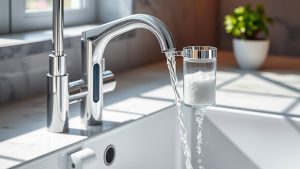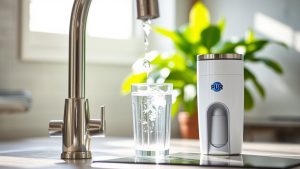
A bathroom sink filter is a device that enhances your tap water quality by removing harmful contaminants like chlorine, heavy metals, and other impurities. It works through various technologies, such as activated carbon or KDF, to guarantee safer and better-tasting water for your daily hygiene. Filters can be installed under the sink, on the countertop, or directly on the faucet, making them convenient for any setup. Discover how each type can benefit you even further.
When you think about improving your bathroom's water quality, a bathroom sink filter can make a significant difference. These filters not only enhance the water's taste and odor but also protect your skin and hair from harmful chemicals like chlorine. By filtering out these contaminants, you can experience a more enjoyable bathing experience while safeguarding your health. Additionally, by reducing the exposure to various pollutants, you may notice improvements in your overall well-being. 51% of U.S. bodies of water are impaired, highlighting the importance of ensuring clean water for your bathroom.
Bathroom sink filters come in different types to cater to your specific needs. Under-sink filters, for instance, are compact and efficiently hidden from view, while countertop filters are easy to install and offer immediate access to clean water. Faucet-mounted filters attach directly to your tap, making them convenient for quick use. Whole house systems are more extensive and can guarantee that every tap in your home provides filtered water.
Although reverse osmosis systems are highly effective, they're less common in bathrooms due to their complexity and space requirements.
The technology behind these filters varies. Activated carbon is a popular choice as it effectively removes chlorine, taste, and odor, improving the overall quality of your water. Ceramic filters trap particles effectively but may not address chemical contaminants. KDF technology excels in eliminating chlorine and heavy metals, making certain that your water remains safe. Some advanced systems employ UV light disinfection to eliminate bacteria and viruses, providing an additional layer of safety for your water.
Installing a bathroom sink filter is generally straightforward, but the process can vary based on the type of filter. Under-sink installations require some plumbing modifications, while countertop and faucet-mounted filters usually involve minimal effort. Most people can handle the latter types without professional assistance, making them accessible options for many homeowners.
However, for certain systems, especially those installed under sinks, you might want to consult a professional to make sure everything's connected correctly.
Regular maintenance and timely replacement of filters are essential for peak performance. Filters typically have a lifespan measured in months or usage gallons, and replacement costs can vary. Keeping track of filter status is important, as neglecting this can lead to decreased effectiveness. Many manufacturers provide customer support to assist with maintenance, and it's wise to choose brands that offer warranties to safeguard your investment.
When deciding on a bathroom sink filter, it's important to assess the specific contaminants in your water. Common contaminants include chlorine, lead, rust, and heavy metals. By understanding your water quality issues, you can select the right filter that meets your needs.
Space constraints can also play a role in your decision; under-sink filters may be better for limited spaces, while countertop options could work well in larger setups. Ultimately, investing in a bathroom sink filter not only improves your water quality but also contributes positively to your health, plumbing, and the environment by encouraging the use of tap water over bottled options.
Conclusion
To summarize, a bathroom sink filter is more than just a practical accessory; it's a critical tool for enhancing water quality and promoting hygiene. By removing contaminants and impurities, it guarantees that the water you use for washing your face, brushing your teeth, and other daily tasks is clean and safe. Investing in a reliable filter not only protects your health but also contributes to the longevity of your plumbing system, making it a wise choice for any household.



